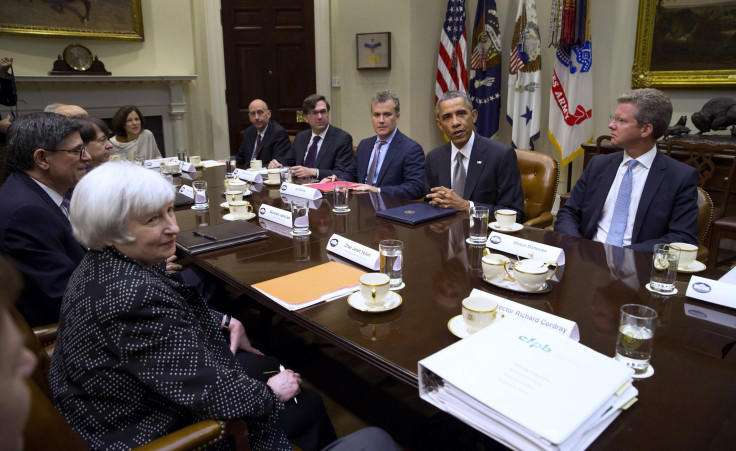Shrinking US Federal Deficit Won't Likely Boost Democrats In Polls

The U.S. federal budget deficit has fallen to its lowest since President Barack Obama took office in 2009, the Treasury Department reported Wednesday. The deficit’s two-thirds decline is the steepest five-year drop in the post-war era, but the news isn’t likely to discourage Republicans from pushing austerity measures, nor will it boost Democratic prospects in the midterm elections.
The gap between government income and spending shrunk by $197 billion in 2013 to $483 billion in the 12 months ending Sept. 30, less than half the trillion-dollar-plus deficits of the 2008 and 2009 fiscal years.
A host of factors are contributing to the shrinking deficit, including cuts in federal spending, higher tax revenues on the strength of stock market gains, a steady decrease in unemployment and the welfare transfers associated with it, and lower-than-projected health care costs.
As shown by a Congressional Budget Office report last week, economists and policy experts have expected the deficit to continue narrowing since getting a glimpse of the government’s budget plans last winter. Republicans and Democrats have been gridlocked over whether cutting government spending in the near term harms or helps a sluggish economy, and the shrinking deficit isn’t likely to change their opinions.
Who can take credit for the diminished deficit? Experts say both political parties are to thank. The numbers are the result of Republican-supported spending cuts as well as stimulative Democratic economic measures. And in their midterm election campaign speeches, candidates of all stripes are likely to take credit for the lower numbers.
“Each [political party] would feel there’s nothing new here to change the fiscal policies they think best,” said Richard Kogan, senior fellow at the Center on Budget and Policy Priorities. “The spending cuts probably got the deficit lower slower. No one can prove the points either way.”
According to Dean Baker, co-director of the Center for Economic and Policy Research, the shrinking deficit “makes those arguing for austerity look pretty foolish.” The government is letting infrastructure decay and providing poorer quality education “because the deficit hawks don’t want us to spend money on these things,” he said.
Others like Greg McBride, chief financial analyst for Bankrate.com, argue the federal deficit, though shrinking, is still larger than pre-recession levels.
“U.S. federal deficits are still inordinately high, both relative to U.S. history and the rest of the world,” he said. “We’ve managed to avoid any consequences thus far because the U.S. economy is doing much better than many other developed economies such as Europe and Japan, and because the U.S. dollar is still the global reserve currency.”
And while Obama presides over a deficit that’s only 2.1 percent of gross domestic product, down from 9.8 percent in 2009, his approval rating is at an all-time low. A Washington Post/ABC News poll released Wednesday found that only 40 percent of Americans approve of his actions as president. Obama’s approval regarding the economy is slightly better and up from the past few years, at 44 percent, but his handling of Islamic State extremists and the Ebola outbreak has weighed down public support. A separate poll by the Wall Street Journal/NBC News finds that Republicans have an edge in the midterm Nov. 4 elections, with 46 percent of voters in favor of a Republican-controlled Congress.
“If the economy were booming, then this kind of news might be enough to help lift a sagging foreign policy assessment, but as it is, mediocre growth and a reduced deficit is not going to outweigh the deep levels of dissatisfaction that Americans have about the direction of the country,” said Lara Brown, director of the Graduate School of Political Management at George Washington University.
© Copyright IBTimes 2024. All rights reserved.












